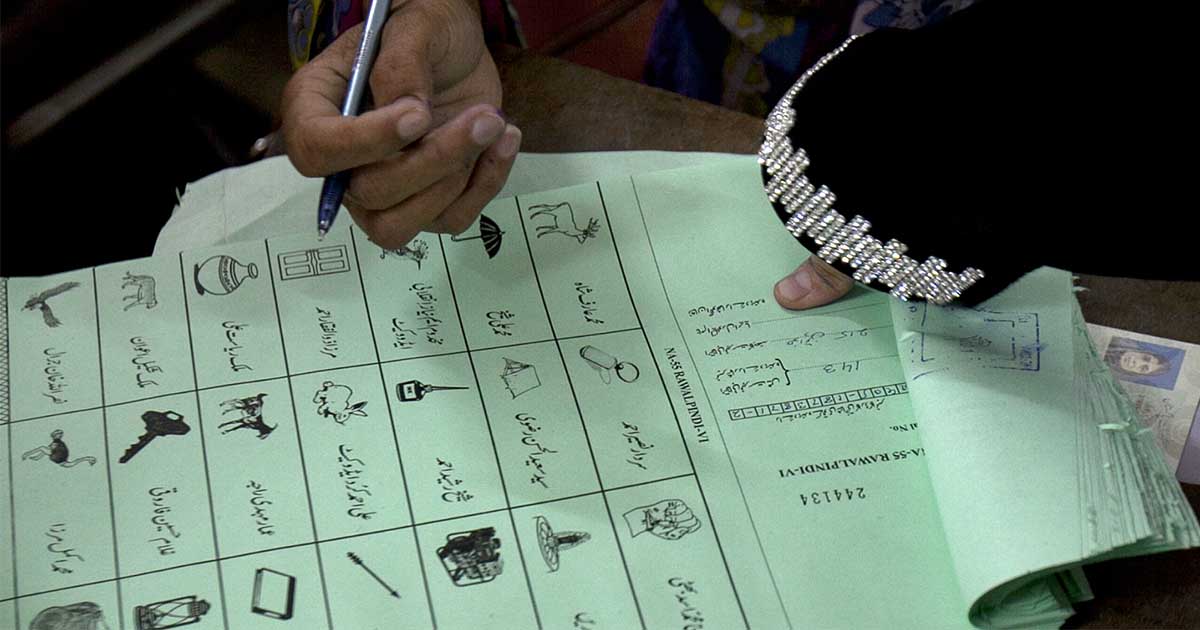The counting of votes cast at the polling stations and tabulation of results by the presiding officers (PO) and transmitting them to the respective returning officer (RO) is a vital electoral process. The returning officer then ‘compiles and consolidates these results’ of all polling stations in the constituencies; a process that has to be transparent, accurate and efficient for ensuring credibility and legitimacy of elections.
It starts after the results are officially delivered by the POs from each polling station to the ROs, who prepare and transmit the unofficial result (Statement of Count) via fax, and mail to Election Commission of Pakistan (ECP) and Provincial Election Commissioner with a copy to Regional Election Commissioner and District Election Commissioner.
For the preparation of the official results, the RO gives written notice of the date, time and place fixed for the consolidation of results to all contesting candidates and their election agents. The consolidation process is held as soon as possible – normally on the 3rd day of the election. On consolidation day, the RO rechecks ballot papers excluded from the count and determines whether these are valid or invalid. He/she also counts postal ballot papers (received directly by the RO). If the RO finds any of the excluded ballot papers (invalid and challenged) to be valid, he/she then includes those in counting.
In order to determine the actual facts leading to the causes of RTS failure forensic audit should be conducted by a competent team of IT experts, having in-depth expertise in domain and technical fields.
Finally, the RO prepares a polling station-wise consolidated statement, records the result of the count on prescribed forms, puts both forms in a tamper-evident bag, which is dispatched to the ECP and deposited in the Government treasury or sub-treasury. In the 2013 General Elections, the ECP implanted the Result Management System (RMS) with technical assistance from the UNDP.
The RMS was implemented by returning officers, but it was not entirely successful; resulting in huge criticism and embarrassment for the ECP. The system was only partially implemented by the ROs across the country. Most of the returning officers had to resort to the manual system of results compilation and consolidation.
Read more: Social Democracy: The Middle Way for Pakistan
The scope of this unsuccessful project was enlarged by adding Result Transmission System (RTS) in 2018 General Elections by the ECP, which miserably failed again at countrywide polling stations. The theoretical concept did not work as a result the announcement of unofficial results was inordinately delayed. It seems that ECP did not conduct a detailed feasibility study based on operational, management, technical, financial, time frame and legal considerations.
It is also doubtful whether a comprehensive implementation plan was ever prepared. The selection of system-development-vendor was done on the basis of lowest bid only and without evaluation of technical solution which was questionable and against the established industry standards.
The system was not tried prior to its implementation in elections. It needed to be tested for proof of concept, varying conditions, and ground realities before its implementation in both developed and undeveloped areas. The subsequent delay in results caused huge embarrassment for the Election Commission and all those institutions supporting the electoral process. In fact, it is not only a technological failure but also an administrative and management failure.
On consolidation day, the RO rechecks ballot papers excluded from the count and determines whether these are valid or invalid. He/she also counts postal ballot papers (received directly by the RO).
RTS was based upon numerous false assumptions like availability of and familiarity with smartphones by 85,000 presiding officers and 849 ROs. The fact is that 3G and 4G coverage is not available across the country, especially in remote far-flung areas. Lack of training of presiding officers and ROs was also one of the key factors of system failure.
Many IT systems do not fail due to technical reasons but due to operational issues. For instance, the non-availability of 3G or 4G is a fact, not a technology issue. Similarly, inadequate training of presiding officers is an administrative issue. For any system to be successful three essential conditions need to be met;
· Ownership and commitment by the top management;
· Dedication and expertise by systems people; and
· Active participation and involvement by the end-users.
In order to determine the actual facts leading to the causes of RTS failure forensic audit should be conducted by a competent team of IT experts, having in-depth expertise in domain and technical fields. The team should consist of experts from National Telecommunication and Information Technology Security Board (NTISB), intelligence agencies, Pakistan Telecommunication Authority (PTA), Ministry of Information Technology, Ministry of Science and Technology, NADRA, ECP, Federal Investigation Agency (FIA), Academia and other relevant institutions and organizations.
A transparent and accountable system of governance requires freedom of expression and association for everyone without discrimination and a clean and efficient judiciary that guarantees the rule of law without prejudice. It’s no good to have laws on the books that are not properly enforced.
Kunwar Dilshad is the former Secretary to the Election Commission of Pakistan and worked in the organization for over 30 years. He is currently the chairperson for the National Democratic Foundation. The foundation’s work is to grow and strengthen democracy in Pakistan.
The views expressed in this article are the author’s own and do not necessarily reflect the editorial policy of Global Village Space.


